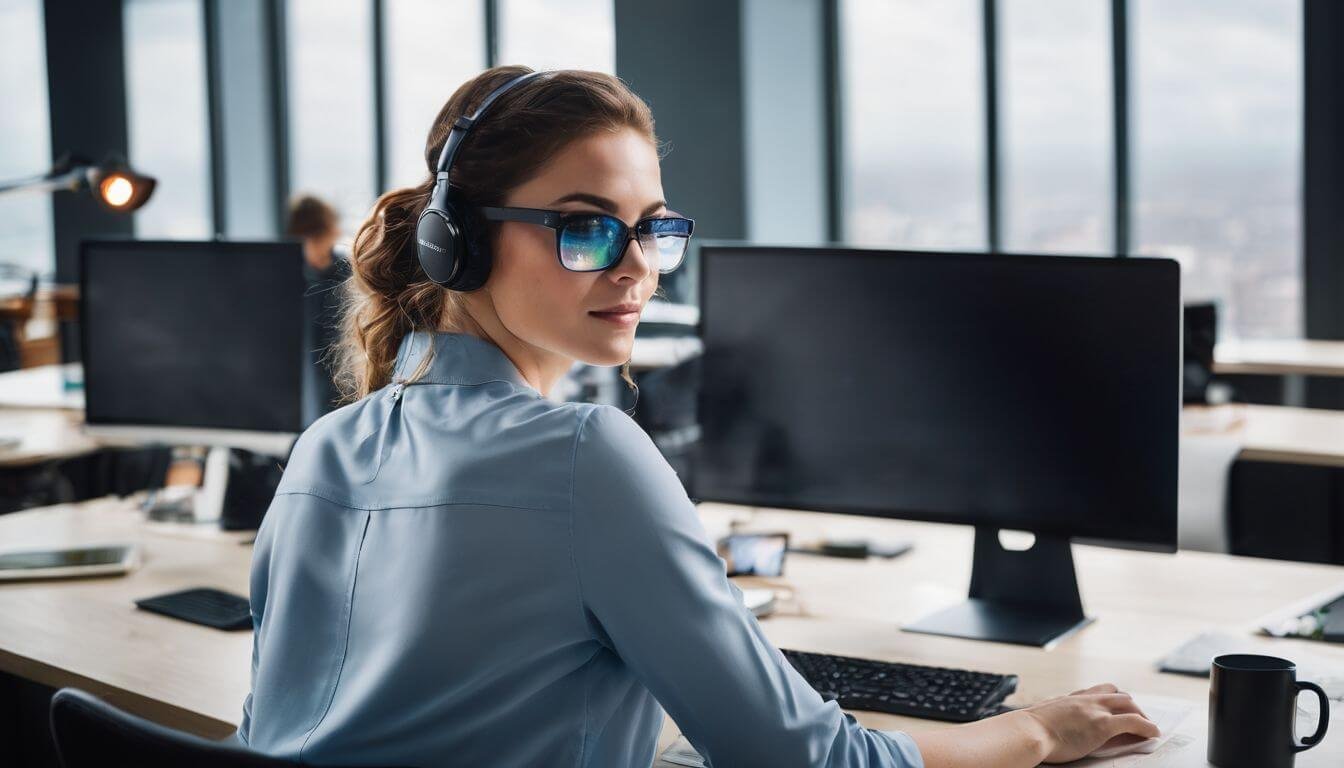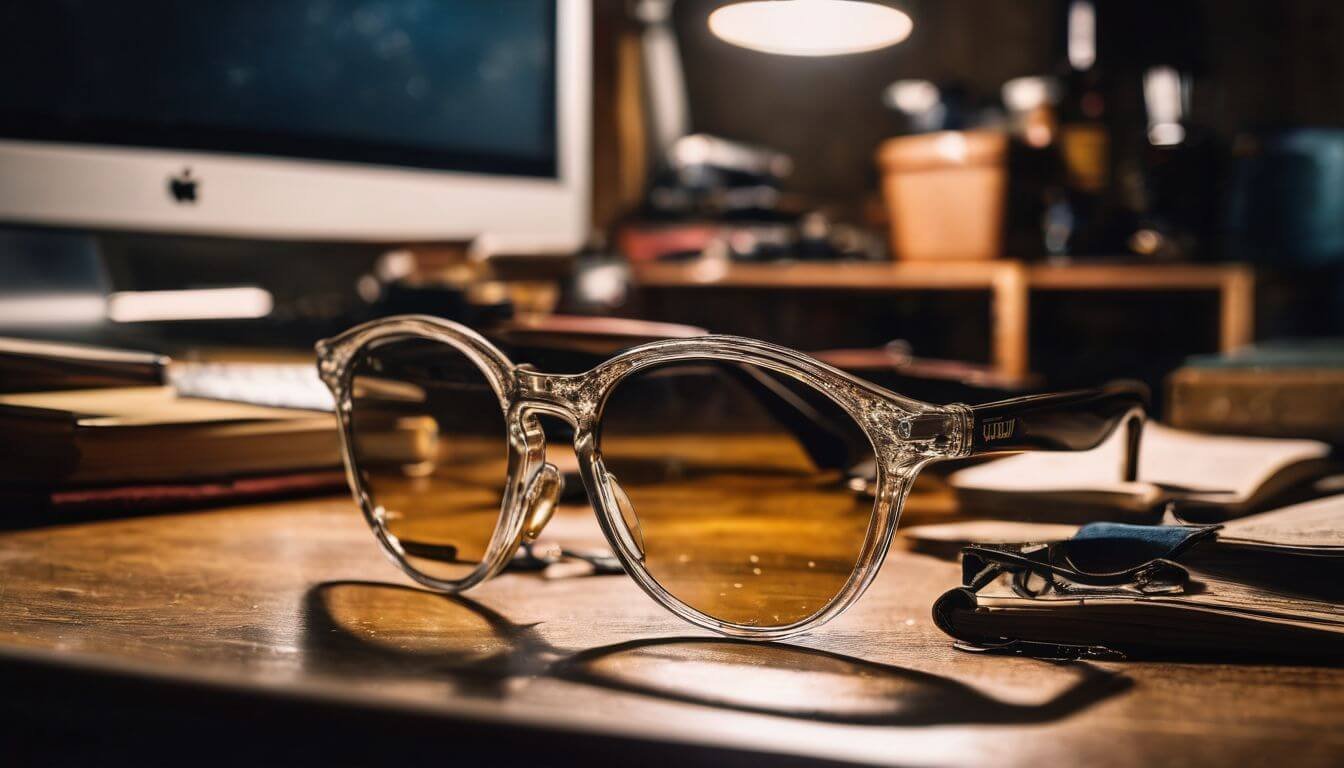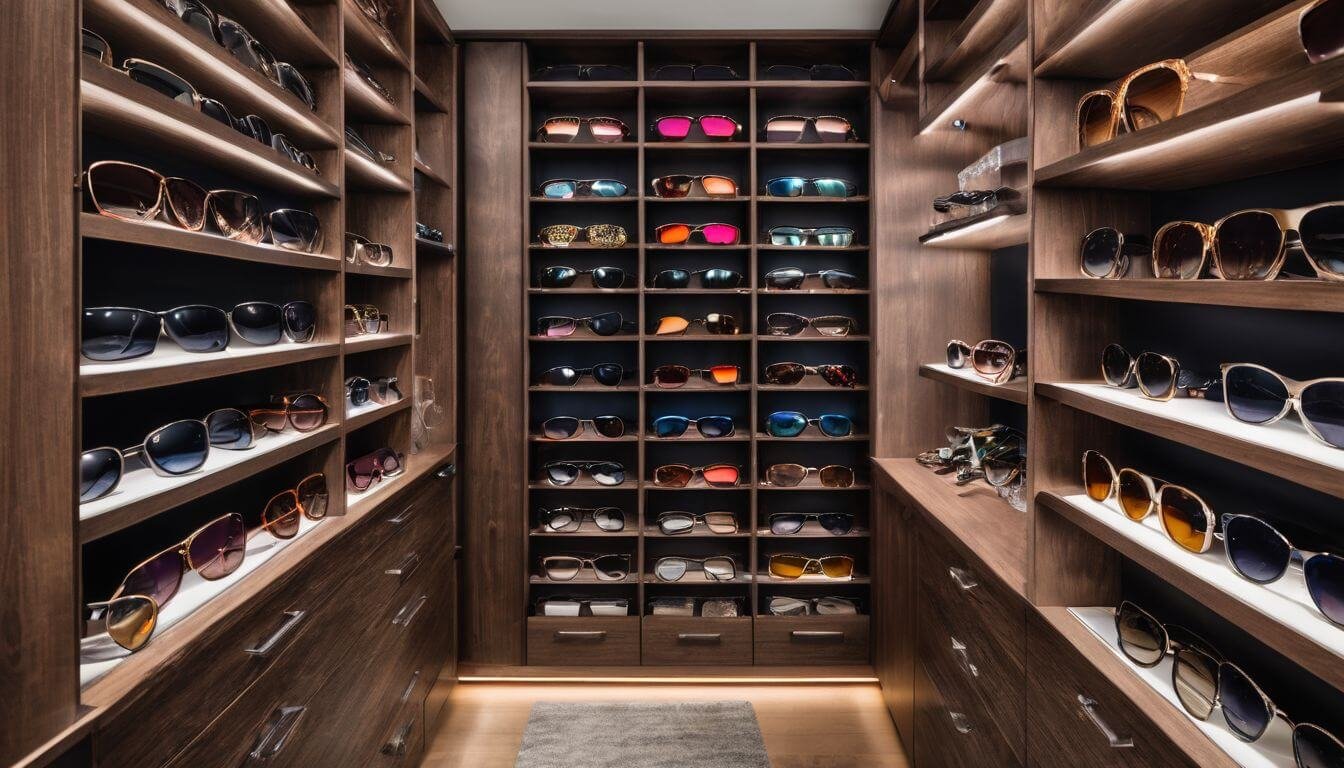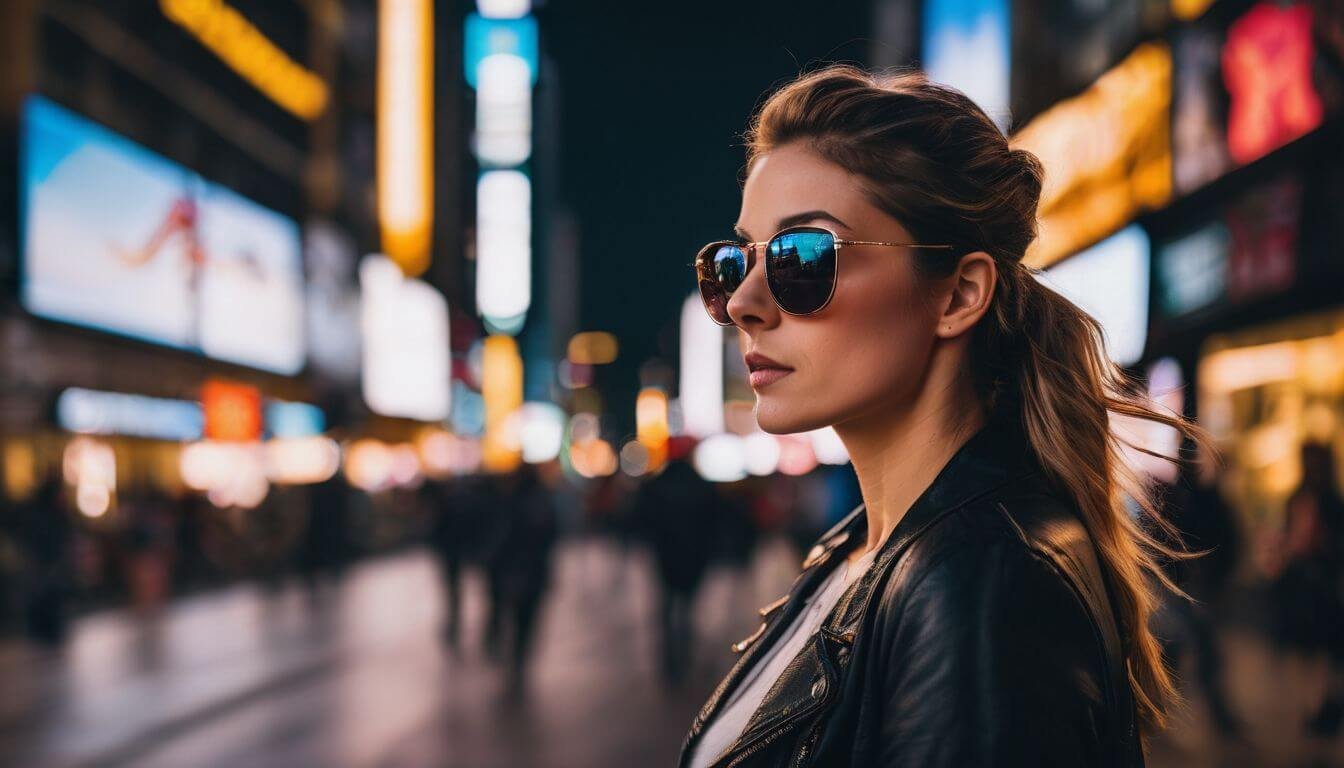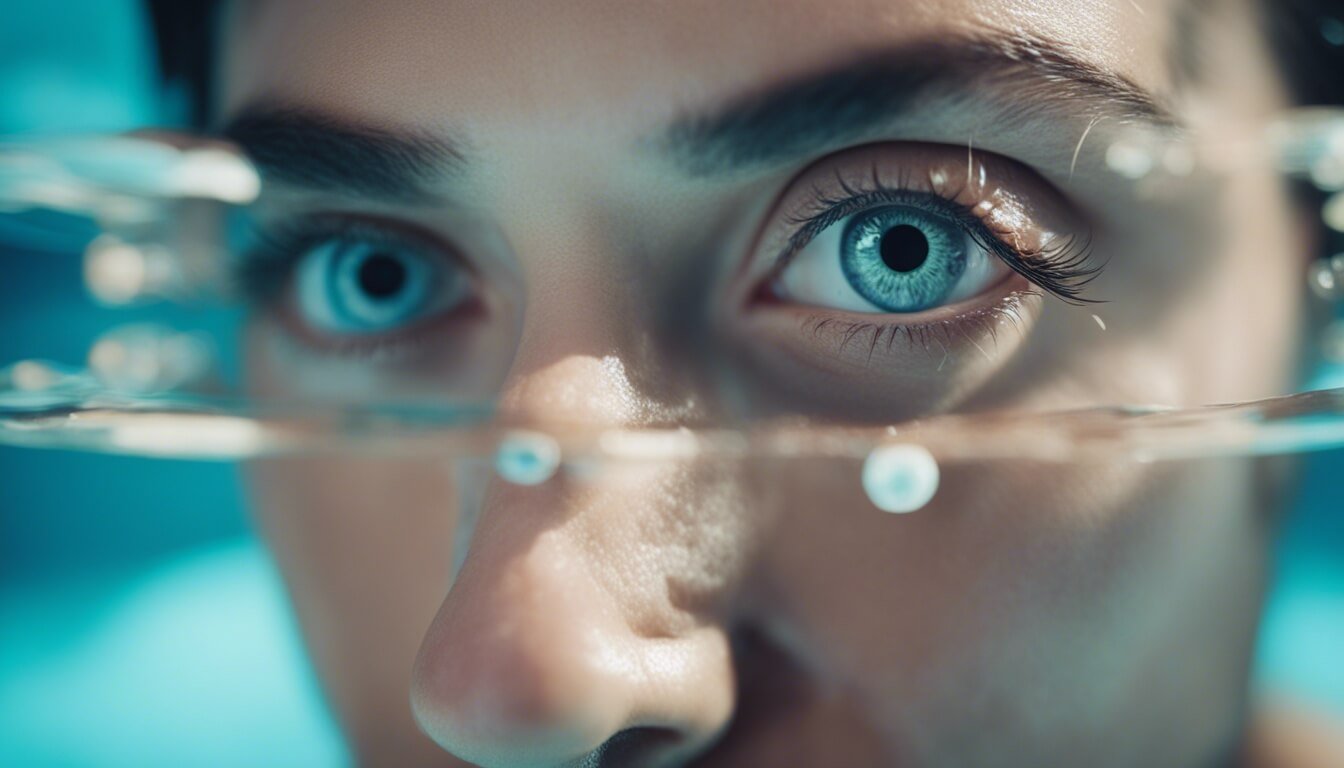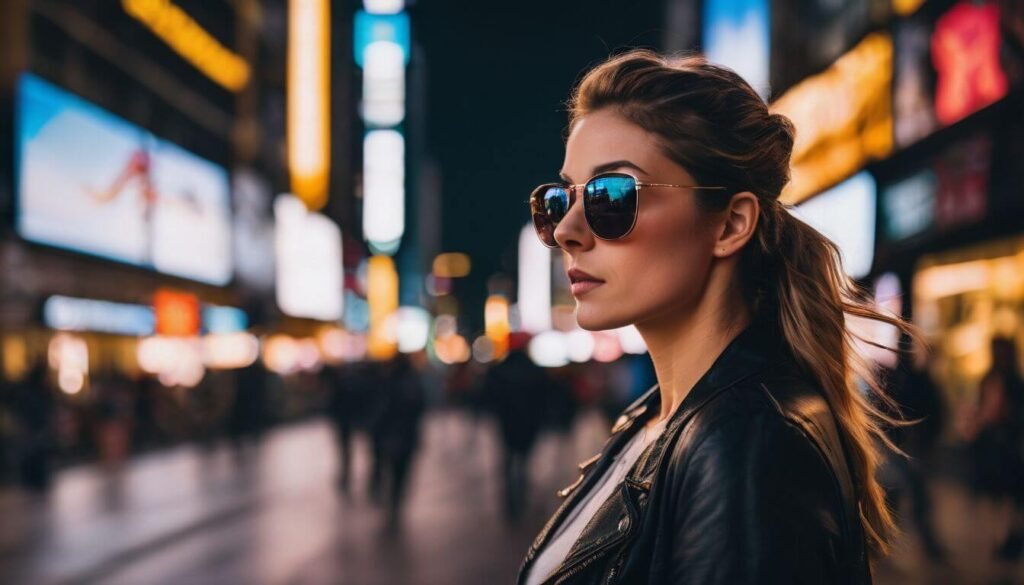
Do Sunglasses Block Blue Light? The Truth Revealed
Ever squinted at your screen and wondered if those chic shades could shield your peepers from pesky blue light? Here’s a quick truth: while sunglasses are superstars at blocking UV rays, their blue-light-blocking powers can be hit or miss.
In this no-nonsense guide, we’ll dish out the deets on what really works to keep that blue glow at bay. Ready for the scoop on how to keep your eyes in the clear? Stick around – you’re about to become a savvy defender against digital glare!
Key Takeaways
- Some sunglasses can block blue light, but not all. It’s important to look for ones labeled “blue light blocking.”
- Regular sunglasses help protect against UV rays, and some may also filter out blue light.
- Blue light glasses are specifically designed to cut down on the blue light coming from screens and can help with eye strain and sleep.
- Not every brand of sunglasses blocks blue light effectively, so it’s good to research and read reviews.
- Besides wearing glasses, you can reduce blue-light exposure by taking screen breaks and using screen filters or apps.
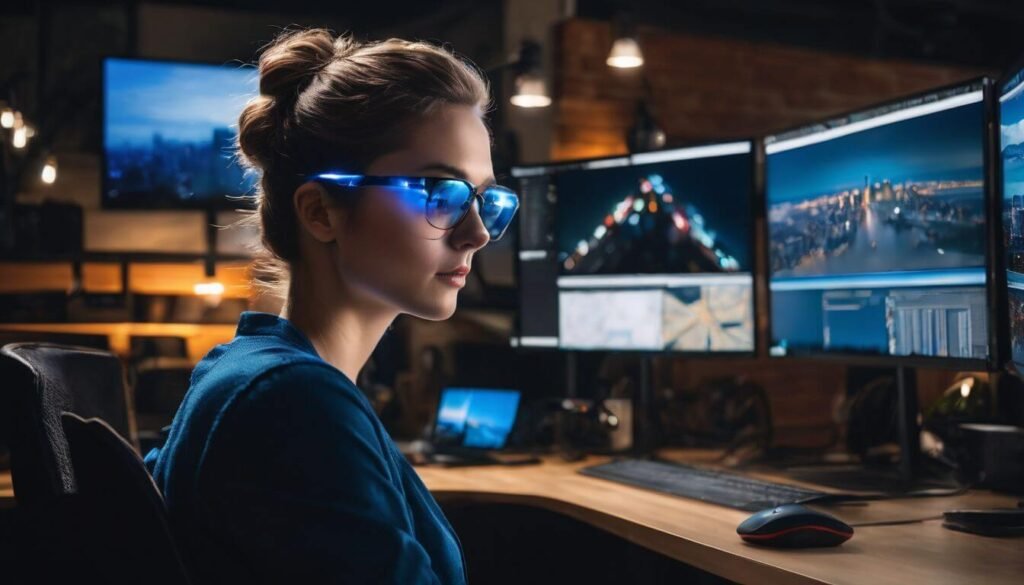
Understanding Blue Light
Blue light is a type of light that’s both good and bad for us. Think about the sun; it gives off blue light, which helps us stay awake during the day. But we also get blue light from screens like phones and computers, and that can be too much sometimes.
Our eyes aren’t great at blocking this kind of light, so when we look at screens a lot, some folks might find their eyes feel tired or they have trouble sleeping.
Scientists are trying to figure out how blue light affects our health. Some say it can make our eyes really tired and give us headaches – even mess with our sleep! They’re looking into special glasses that block blue light to see if they help people’s eyes feel better.
Even though lots of people use these glasses, no one knows for sure yet how well they work. So yes, there’s a bit of a mystery around these shiny specs!
What is Blue Light?
Light comes in many colors, and blue light is one of them. It’s a type of visible light with shorter waves and more energy than other colors. You get blue light from the sun, but also from digital devices like smartphones, computers, and TVs.
This kind of light can reach deep into your eyes and may cause eye strain or mess with your sleep if you see too much of it at night.
You’ve probably heard that too much blue light isn’t great for you. Some people wear special glasses to block it out when they’re looking at screens or use filters on their devices.
These are called blue-light-blocking glasses or just blue-light glasses for short. They’re meant to help protect your eyes by cutting down the amount of this high-energy light that gets in.
Effects of Blue Light on Health
Blue light comes at us from many places. It’s in sunlight, but it also shoots out from the screens we stare at all day – like phones and computers. This kind of light can mess with our sleep because it tells our brains it’s still daytime when it’s really night.
If you’re trying to snooze but spent a lot of time before bed looking at your phone or computer, you might find it harder to drift off.
Folks have mixed thoughts about how blue light affects us besides messing with sleep. Some say wearing blue light glasses eases eye strain and headaches after long hours staring at screens.
But scientists haven’t fully backed this up yet; they’re still digging into how much these glasses help. What they do agree on is that too much screen time without breaks isn’t great for your eyes no matter what type of glasses you wear.

Sunglasses and Blue Light Protection
Sunglasses do more than make you look cool. They shield your eyes from the sun’s rays. The right kind of sunglasses can help block harmful blue light too. Not all sunglasses are the same though.
Some have special lenses that filter out blue light.
You might wonder about regular shades and if they block this light. Well, it depends on the type of lens they have. Darker doesn’t always mean better for blocking blue light. Lenses with UV protection can tackle some amount of blue light as well.
If you spend tons of time outside or staring at screens, think about getting sunglasses labeled as “blue-light blocking.” That way, you’re keeping your eyes safe while rocking a stylish look!
How Sunglasses Protect Eyes
Squinting in the bright sun hurts your eyes, right? Think of sunglasses as a cool shield. They keep harmful UV rays that come from the sun out of your eyes. Some even block out blue light! This means less squinting and more playing outside without worry.
Lenses in sunglasses do an awesome job. They filter blue light and protect you from glare when you’re using computers or smartphones. So they’re not just for looking good – they actually help keep your eyes happy and safe!
Types of Sunglasses for Blue Light Blocking
Sunglasses come in many styles to keep your eyes safe. Some help block that blue light you hear about.
- UV Protection Lenses: These lenses are tops for keeping out UV rays and some blue light too. They’re like sunscreen for your eyes when the sun is bright.
- Blue Light Blocking Glasses: Made just for fighting off blue light, these glasses mean business. They use special filters to stop blue light from digital devices.
- Polarized Lenses: Great at cutting glare, they might block a bit of blue light as well. Still, it’s smart to check because not all do this well.
- Computer Glasses: Sitting all day at screens? Computer glasses can be good pals. They reduce blue light and help your eyes stay chill.
- Photochromic Lenses: Walk outside and bam! These lenses get darker. They adapt to the light around you and help against both UV and blue light glare.
- Wraparound Sunglasses: Want more protection? Wraparound shades cover the sides of your peepers too, blocking sneaky rays that try to creep in.
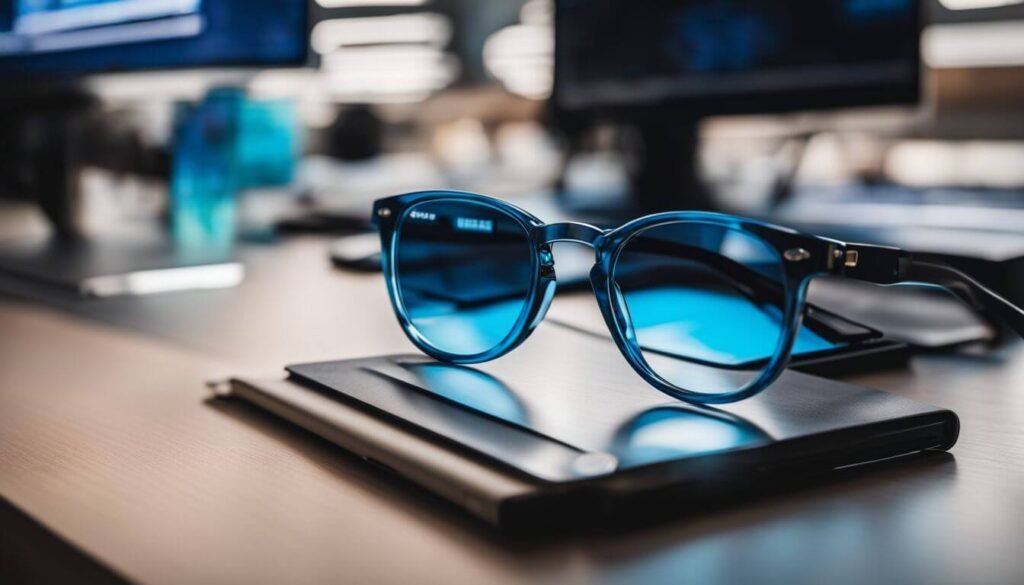
Case Studies and Examples
People want to know if sunglasses really keep out blue light. So, they did some tests! They looked at different kinds of sunglasses and checked how good they were at blocking blue light.
Guess what? Regular sunglasses might stop some blue light, but not like the special ones made for that purpose. These are called “blue light blocking” glasses, and boy, do they make a difference!
Now, about brands – it’s a mixed bag. Some say their lenses block lots of blue light; others don’t seem to do much. You’ll find some brands with fancy terms like “equipped with blue light blocking,” but you gotta check if it’s true.
Studies show that just because glasses claim to be super good against blue light doesn’t mean they are the best choice.
Sure enough, regular shades protect from UV rays – the stuff that comes from the sun and can hurt your eyes. But when it comes to artificial sources of blue light – like from phones or computers – you might need something more specific than your usual pair of sunglasses.
It seems wearing those specially designed for screen time could help ease eye strain after looking at digital screens all day long.
Let’s face it; we live in a world full of screens (yep!), so knowing how to shield our eyes is pretty important!
Effectiveness of Different Brands
When it comes to filtering out the pesky blue light, not all sunglasses are created equal, my friends. Some brands are stepping up their game, offering shades that claim to provide superior protection against that blue glare. So, let’s put those shades to the test and see which ones really keep those blue light blues at bay.
| Brand | Blue Light Blocking Level | Lens Technology | User Feedback | Price Range |
|---|---|---|---|---|
| Brand A | High | Polarized & Tinted | Mixed reviews, some report less eye strain | $$$ |
| Brand B | Medium | UV Protection & Blue Light Coating | Positive sleep improvements noted | $$ |
| Brand C | Low | Standard UV Protection | Users like the style, but less effective for blue light | $ |
Ah, the sweet spot, Brand B seems to be hitting it just right with that middle-of-the-road approach. They’re not robbing your wallet blind, and users are nodding off easier at night, score one for the sleep-deprived! Brand A, though, they’re going all out with the tech, but it’s a bit of a hit or miss — and let’s not even start with the dent in the bank account. Brand C? Well, you get what you pay for, and in this case, it’s more about looking cool than viewing cool, if you catch my drift.
Remember, folks, these flashy specs aren’t a one-size-fits-all. You’ve gotta weigh those pros and cons, and hey, maybe chat with a doctor before you splurge on a pair. Keep those peepers happy, folks, whether you’re scrolling through your phone or soaking up some sun!
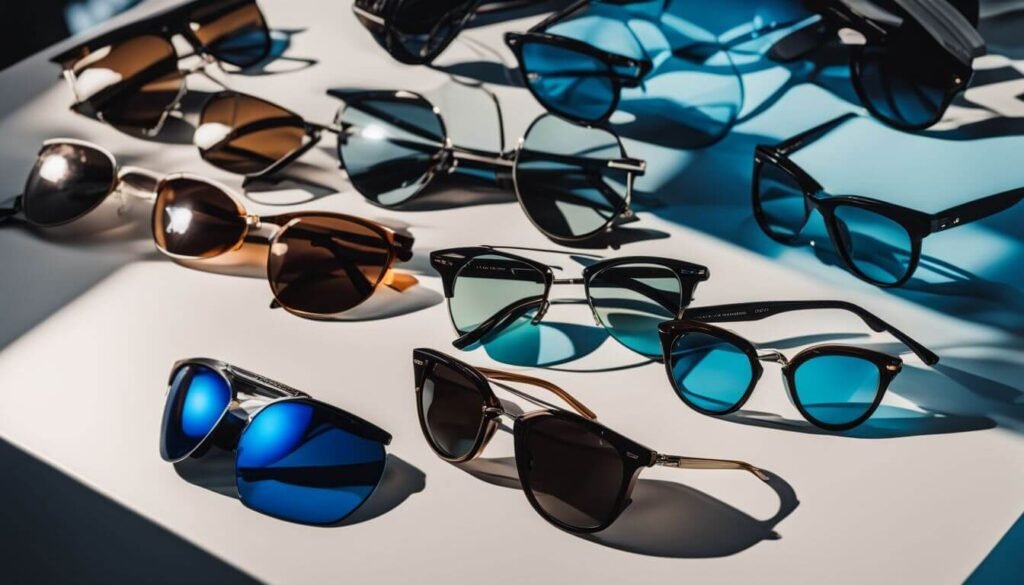
Alternatives and Additional Protection
Not all sunglasses block blue light, but other gear can help. Blue light glasses are a big deal these days. They’re made to stop that blue light from devices and indoor lights right in its tracks.
(Yep, the same stuff that might mess with your sleep or make your eyes tired.) And guess what? Regular shades also keep UV rays away from your peepers – some even say polarized lenses could help with blue light too.
But hey, don’t just rely on glasses. Your screen habits matter as well! Taking breaks from staring at phones or computers is super important. Maybe tweak the settings to reduce glare and use softer lighting around you.
Together with those cool specs, you’ve got yourself a solid defense team against those sneaky blue rays!
Blue Light Glasses vs. Sunglasses
Blue light glasses and sunglasses seem like they do the same thing, but they’re pretty different. Let’s look at how each one helps our eyes.
- Blue light glasses are made to cut down on the blue light we get from screens.
- They say wearing blue light glasses might make you sleep better and keep your eyes from getting tired.
- But hey, not all the science agrees on how well these glasses work.
- Now, sunglasses are champs at blocking UV rays from the sun.
- They can also help keep some blue light out of your eyes.
- Think about it; when you wear sunglasses outside, you’re keeping a lot of that bright blue sky away from your peepers!
- Some folks say polarized sunglasses can help with blue light too. Yet, we need more proof for that.
- Sunglasses come in different colors, and some shades are better at dealing with blue light than others.
- Blue light glasses focus on lights from our gadgets while UV protection in sunglasses guards us against sunlight.
- Even without solid proof, some people swear by their blue light glasses. It doesn’t hurt to try them if they feel good for you!
- Have you heard about the debates? Yeah, there’s a lot of talk about whether these glasses really help. Still thinking if they’re worth it? Chat with a doctor or eye expert to get their take.
Additional Measures to Protect Against Blue Light
You want to keep your eyes safe from blue light. Here are some smart moves you can make:
- Wear blue light filter glasses when looking at screens. They’re made to block the blue light that comes from computers and phones.
- Keep screens away from your face. The farther you are, the less blue light hits your eyes.
- Take breaks often. Look away from screens every 20 minutes to rest your eyes.
- Use screen filters or apps. These can cut down on how much blue light gets to your eyes.
- Set screens to warmer colors. This helps lower the amount of blue light they give off.
- Dim the lights indoors at night. Bright lights make your body think it’s daytime, which can mess up sleep.
- Try not to use devices before bed. It’s best for your sleep if you put them away an hour before going to sleep.
- Check out lenses that block UV. They can also help protect your peepers from blue light.

Choosing the Right Protection
Picking the right sunglasses is key to shielding your eyes from blue light. Look for ones that are more than just a fashion statement. They should block UV rays and fit well with your daily life.
Sunglasses labeled as “blue light blocking” are out there, but let’s keep it real—not all shades are created equal.
To make sure you get the best protection, check if they have lenses designed to filter out both UV light and blue light. Now, I’ve heard folks mention polarized lenses might help too, yet we need more proof on that one (Important fact 8).
Remember what counts; protect those peepers because too much screen time or sunshine could really tire them out! And hey, even though some say blue light glasses can up your sleep game or ease eye strain (Important Fact 2), always talk to an eye doc before you jump in—better safe than sorry!
How to Choose Sunglasses for Blue Light Blocking
Choosing the right sunglasses to block blue light is important for your eye health. You want glasses that protect your eyes and still look great.
- Look for labels saying “blue light blocking.” This means the lenses can stop blue light from reaching your eyes.
- Check if they say “100% UV protection.” Lenses with this label also filter out harmful blue light rays.
- Find out if the lenses are polarized. Polarization helps reduce glare, but not all polarized lenses block blue light, so you have to double-check.
- Ask about the color of the lens. Some colors, like amber or brown, might be better at blocking blue light than others.
- Think about getting photochromic lenses. These change from clear to dark when you’re outside in the sunlight where you find much of the blue light.
- Try them on! Make sure they fit well and don’t let light in around the frames.
- Go for wraparound styles. They cover more of your eyes and give better protection from all sides.
- Consider different brands and prices. More expensive doesn’t always mean better when it comes to blocking blue light.
- Read reviews and research. See what others are saying about their effectiveness in blocking blue light.
- Talk with an eye care pro. Get advice on which sunglasses work best for protecting against blue light exposure.
Innovations in Eye Protection
Eye care tech is getting better all the time. Now we’ve got smart sunglasses that not only look cool but also do a great job at blocking out the bad stuff from light – like UV rays and blue light.
They’re using new materials to make lenses that can filter more blue light than ever before.
Some companies are stepping up their game, too. They’re making glasses with special coatings that keep your eyes safe from screens and indoor lighting – where a lot of blue light comes from.
And guess what? These high-tech shades aren’t just for grown-ups; kids can wear them too, so everyone’s eyes stay happy and healthy!

Conclusion
So, do sunglasses really block blue light? You bet they can! But remember, not all shades are the same. Some are better at keeping those blue rays away from your peepers. If you’re picking out a pair, check how much blue light they cut down.
And hey, if you spend lots of time on screens or under artificial lights, consider grabbing some blue light glasses too. Stay smart and shield those eyes!
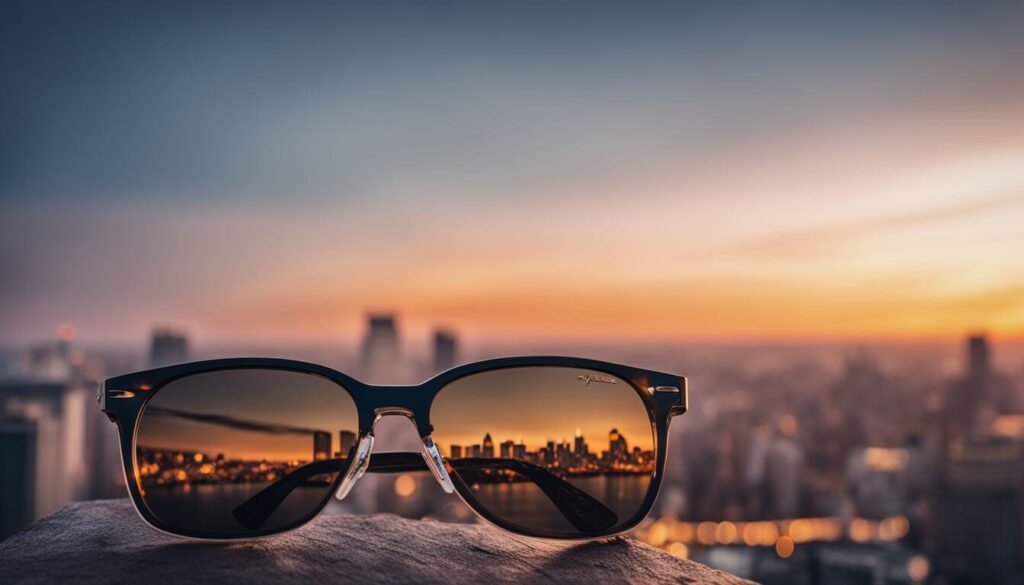
FAQ
Q: Do sunglasses block blue light?
A: Some sunglasses are designed to block blue light, especially those specifically labeled as blue light blocking sunglasses. However, regular sunglasses may not effectively block the blue light spectrum.
Q: How can sunglasses protect your eyes from blue light?
A: Sunglasses can protect your eyes from blue light by utilizing special lenses that filter out this range of the light spectrum. Blue light blocking sunglasses not only block the majority of harmful blue light emitted by the sun, but they also filter blue light from artificial sources such as digital devices.
Q: Do all sunglasses block blue light?
A: Not all sunglasses block blue light. It’s important to choose blue light blocking sunglasses to ensure you get maximum protection from blue light. Regular sunglasses mostly protect your eyes from UV radiation, but may not provide complete blue light protection.
Q: Can exposure to blue light be harmful to my eyes?
A: Overexposure to blue light, especially from sources like digital devices, can cause digital eye strain, sleep disturbances, and long-term vision issues. The blue light emitted from the screens of these devices falls within the harmful range of the light spectrum.
Q: How can I protect myself from blue light exposure if I use digital devices frequently?
A: Using blue light blocking glasses can significantly reduce your exposure to blue light from digital devices. Be sure to take regular breaks too, to further decrease your exposure to this potentially harmful light.
Q: What are the effects of blue light on vision and health?
A: Blue light has been associated with an increased risk of macular degeneration, a serious eye condition. Some studies also suggest it may potentially disrupt the sleep cycle and contribute to digital eye strain. Blue light-blocking glasses can help mitigate these risks.
Q: Do I need blue light blocking sunglasses if I’m already wearing UV protection sunglasses?
A: Even though UV protection sunglasses protect your eyes from harmful UV rays, they may not effectively block blue light. To ensure full protection, it would be best to choose sunglasses that offer both UV protection and blue light filtering.
Q: What options for blue light protection do I have besides using sunglasses?
A: Besides blue light blocking sunglasses, you can also adapt your digital device usage by implementing screen filters that block blue light or using blue light blocking screen protectors.
Q: What difference do I expect to see when I wear blue light blocking sunglasses?
A: Blue light blocking sunglasses have a slightly yellowish tint that filters out blue light. As a result, they may alter the color perception slightly. However, they can significantly reduce the blue light glare, improve contrast, and reduce strain on your eyes.
Q: Are there any side effects of wearing blue light blocking glasses?
A: While blue light blocking glasses protect your eyes from harmful blue light, some people might experience slight color distortion due to the filtering. However, most people adjust to this minimal change relatively quickly.


